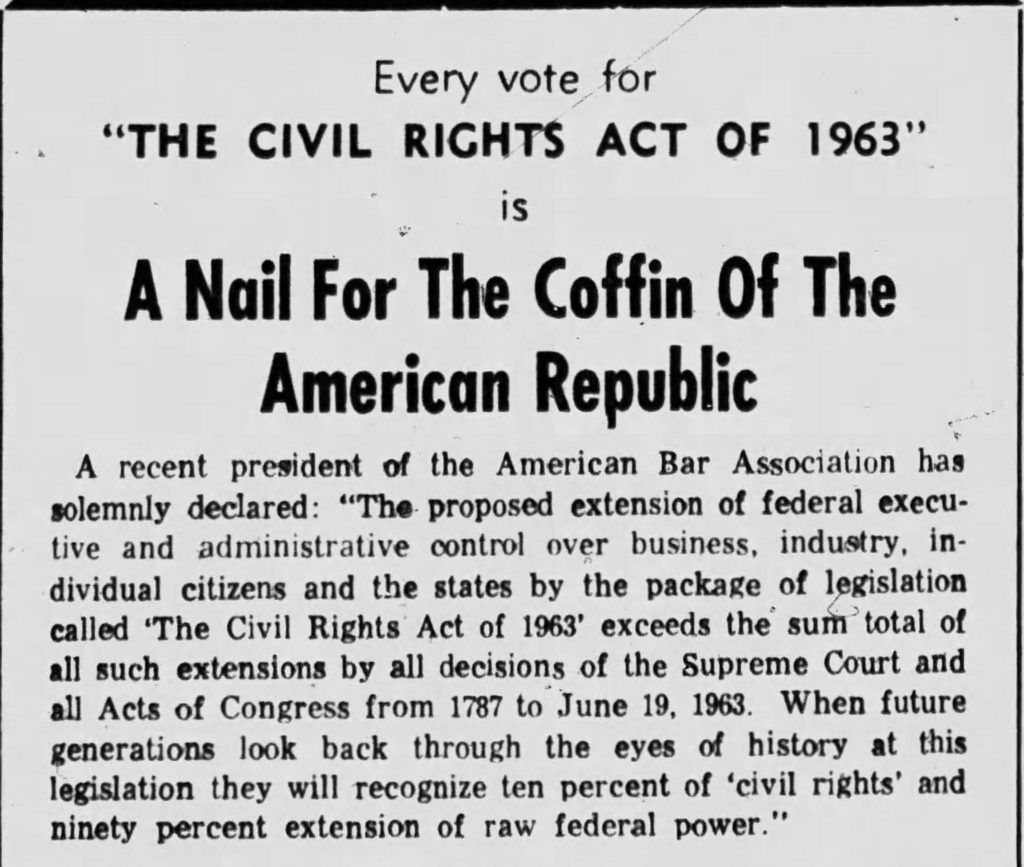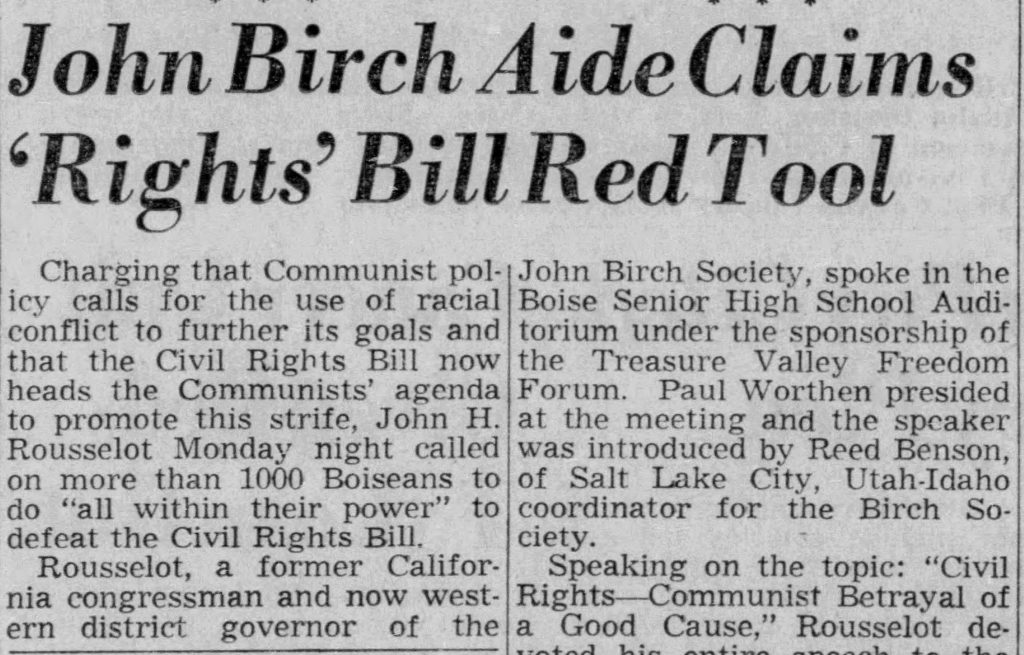When in the late spring of 1964 the United States Senate defeated the longest filibuster in Senate history and passed the landmark Civil Rights Act, the Senate’s majority leader Mike Mansfield called the matter of insuring fundamental rights to all Americans – the right to fair treatment in accommodations and employment, for example – “the most divisive issue in our history.”
Montana’s Mansfield, a westerner of few words who always chose them well, called passage of the legislation over the committed opposition of southern segregationists and a few very conservative Republicans an “exceptional accomplishment.” It had been the work of both political parties. The bill, years in the making, passed with a large bipartisan majority.
Senate Republican leader Everett Dirksen of Illinois, who rallied Republicans to the cause of civil rights, hailed the historic accomplishment as “an idea whose time has come.” One holdout who refused to follow Dirksen’s lead was Arizona Senator Barry Goldwater, who became the GOP presidential candidate later in 1964. Goldwater’s refusal to embrace civil rights legislation – he argued it was an unconstitutional federal power grab – is an attitude that still echoes through the Republican Party nearly 60 years later.
What Mike Mansfield, who played a pivotal role in passage of the Civil Rights Act, rarely acknowledged during the often-bitter fight around the legislation was the depth of opposition to the measure from his own voters, not to mention the misguided vehemence of arguments opponents fielded in defense of discrimination.

A Eureka, Montana constituent wrote Mansfield early in 1964, “It is my firm conviction that the Civil Rights Bill is a radical, unconstitutional and thoroughly unacceptable proposal, in that it will destroy the basic rights of all individuals through federal intervention.”
A Billings couple wrote Mansfield, “Individual freedoms cannot be removed, either collectively or one at a time, without leading us along the road to socialism which will enslave us all, black and white alike.”
In what was clearly a coordinated lobbying effort, several anti-civil rights letters to Mansfield used the same language: “The Civil Rights Bill before the Senate now, is 10% civil rights and 90% take-over of all activities of life.”
Western states in the 1960’s seemed far removed from the civil rights protests and demonstrations in distant Selma or the massive march on Washington in 1963 that helped set the political stage for the legislation that followed.
But the West was, in many ways, a key to passage of both the Civil Rights and Voting Rights Acts. Idaho’s then-bipartisan Senate delegation – Len Jordan, a very conservative Republican, and Frank Church, a liberal Democrat – voted for both pieces of legislation, even amid a drumbeat of local opposition.
When Jordan, who ran sheep in Hells Canyon during the Great Depression and later became Idaho’s 22nd governor, announced he would vote to end the filibuster that was preventing a Senate vote on a civil rights bill, his comments ran side-by-side in the Idaho Statesman with a story from Baldwin, New York, a community on Long Island. That story reported that the home of a Black family had been defaced with a red swastika and “insulting lettering” that demanded the family “get out now.” Neighbors – all of them white – showed up to repaint the house and signal the community’s “shame” for what had been done.

Senator Jordan indicated his mail was running heavily in favor of support for civil rights, but the sentiment was hardly universal. A doctor in Burley said in a public meeting that he opposed efforts to outlaw racial discrimination because it “would rob doctors and professional men of their rights to refuse service to anyone for any reason.” A John Birch Society sponsored meeting in Boise drew a hundred people who were told a civil rights bill was part of a Communist plot to promote strife. A letter writer to the Twin Falls Times-News said he opposed integration because it was a “stepping stone to mongrelization.”

The country is now locked, as it arguably hasn’t been since 1965 when the Voting Rights Act passed, in a battle over who votes and how in America. One party – Democrats – are trying to make it easier for many Americans to vote. The other party – Republicans – are operating at every level of government to make voting more difficult. The bipartisan consensus represented in the 1960’s by Mansfield and Dirksen and Church and Jordan is as unimaginable today as it was enlightened then.
“The ‘bipartisan tradition’ backing voting rights is, in many ways, a mirage,” Princeton history Kevin Kruse wrote recently. “The liberal and moderate Republicans who helped create the [Civil Rights and] Voting Rights Act are long gone, as are the prominent conservatives who saw no conflict between their ideology and democracy and who were confident their party could win elections even if everyone voted. What remains in the Republican ranks is a core that sees voting rights as a clear and present danger to the party.”
Need proof? Republican legislatures in Texas, Arizona, Florida and Georgia have all enacted new restrictions on voting since the last presidential election. One rural county in Georgia is close to deciding to have only one polling place in the entire county. Democrats have been booted off election boards and one newly reconstituted board eliminated Sunday voting during a recent municipal election, a decision aimed squarely at Black churchgoers, a key Democratic constituency.
The Republican rationale for opposing new federal voting rights legislation is remarkably similar to what passed for arguments against civil rights and voting rights in the 1960’s. “Every single proposed change,” former vice president Mike Pence said recently, “serves one goal, and one goal only: to give leftists a permanent, unfair, and unconstitutional advantage in our political system.”
Other Republicans worry about a federal takeover of elections, a specious argument since the Constitution speaks to a clear federal role in how elections are conducted, and a federal role in elections was precisely why Congress passed the Voting Rights Act in the first place.
Idaho Republican Senator Mike Crapo, like so many in the past who tried to limit voting, invoked the old “state’s rights” argument, channeling the segregationist talking points of the 1950’s and 1960’s. You wonder if these guys know anything about the kind of voter suppression that took place in so many places for so long. Or, more likely they just don’t care.
Some conservatives have been more honest with their objections to the idea of more Americans voting. “I don’t want everybody to vote,” Paul Weyrich, an architect of the modern conservative movement said in 1980. “Elections are not won by a majority of people. They never have been from the beginning of our country, and they are not now. As a matter of fact, our leverage in the elections quite candidly goes up as the voting populace goes down.”
The structure of the American system is under assault and restricting voting is at the heart of the attack. The assault is just as real now as it was in the 1960’s. Bipartisan good faith triumphed then. What now?
—–0—–
Additional Reading:
Why There’s a Civil War in Idaho — Inside the GOP
A deep and I think pretty accurate dive into Idaho’s increasingly crazy GOP politics.
“So why are Idaho Republicans at each others’ throats? The intraparty divisions center on, and have been fanned by, two polarizing figures: [Janice] McGeachin and Priscilla Giddings, a state legislator who’s been called McGeachin’s ‘de facto running mate.’ Giddings has joined her at campaign events, and co-chaired McGeachin’s ‘Task Force to Examine Indoctrination in Idaho Education.’ The task force failed to find the ‘teachings on social justice, critical race theory, socialism, communism, Marxism’ it sought but did produce a spicy public-records scandal.”
The Idaho Republican Party has always had its nut cases, but now they are increasingly in charge. Here is a link to the Politico story.
Stranded dog saved from rising tide after rescuers attach sausage to drone
OK, we all need a story like this…
“Millie disappeared after slipping her lead in Havant, Hampshire, and after frantic public appeals was spotted on the mudflats, in danger of being engulfed by the tide. She resisted efforts to encourage her to a safer spot until a drone pilot suggested attaching food to one of the unmanned aerial vehicles that had been used to track the dog.”
A sausage on a drone did the trick.
Be well. Stay safe. Thanks for reading.
